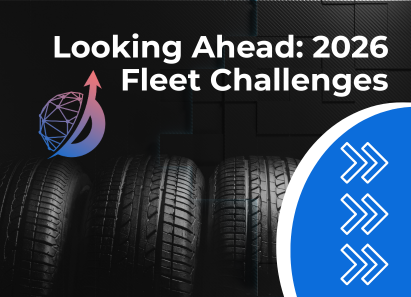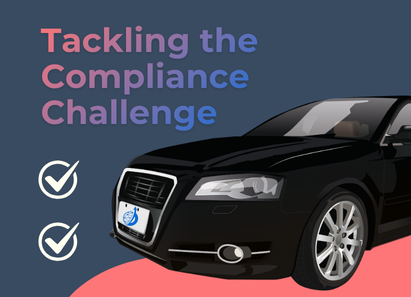
As the automotive market slowly returns to normalcy, fleet managers are settling into the first days of 2024 with undeniable optimism. Vehicle supply is expected to hit pre-pandemic levels, helping to apply downward pressure on vehicle prices. And the seller’s market of the previous few years is predicted to end in 2024. But as a sense of balance is restored to the automotive industry, plenty of emerging dynamics will keep fleet managers on their toes. From EVs and AVs to the new skill sets that these technologies require, we’re entering a year when a forward-thinking approach is essential to success.
With technology progressing at breakneck speed, it can be overwhelming to stay on top of every advancement. But by keeping key trends on your radar, you can position your fleet for success in 2024 — and be ready to adopt emerging technologies at the right time for your fleet. Here are the must-know technology trends that will shape fleet management in 2024, straight from our experts.
Fleet Electrification and Sustainability
In its New Year forecast, Cox Automotive calls 2024 “the Year of More” for electric vehicles (EVs). And for good reason: Numerous dynamics are converging to make electrification more attractive than ever, especially for commercial fleets. The price gap between EVs and gas vehicles is now under $3,000, and McKinsey describes fleet decarbonization as “demonstrably viable” — even for the transportation sector. Meanwhile, net zero targets and consumer pressures are pushing more businesses than ever to prioritize sustainability. Although commercial fleets have lagged behind consumers in EV adoption, industry experts believe that 2024 may be a tipping point.
Switching to EVs is no small feat. It will require fleets to update their approach to maintenance, safety and even the total cost of ownership (TCO). But whether or not it’s the right time for your fleet to make the switch, the momentum behind electrification isn’t going anywhere — and understanding how it can impact your operations is critical. With a proven track record for helping fleets navigate alternative fuels, Onward is equipped to guide you every step of the way.
For many fleets, sustainability means electrification. But there’s also clear value in enhancing your operational efficiency, which can boost your sustainability while strengthening your bottom line. Let us help you optimize your operations to unlock environmental and economical gains.
AI for Telematics, Predictive Maintenance and Beyond
The momentum behind artificial intelligence (AI) is stronger than ever, with this game-changing innovation now impacting nearly every industry imaginable. AI is already transforming the day-to-day of many fleet managers; in 2024, this trend will continue through advancements in telematics, predictive maintenance and beyond.
As a fleet professional, you’re no stranger to telematics. Through specialized AI algorithms, these systems are becoming even more powerful at turning data into actionable insights. AI can enhance the value of driver-facing cameras by detecting potentially dangerous driver behaviors — think: fatigue or distraction — and instruct the driver to take corrective action. AI also has the potential to go beyond merely documenting unsafe driver behavior like swerving, instead detecting whether the behavior was necessary based on the situation. And by building a library of data over time, AI can detect abnormalities early to nip issues in the bud. One example? Proactively addressing a driver who repeatedly takes longer than usual to complete their route.
Along with telematics, AI is also enhancing the effectiveness of predictive maintenance. By leveraging a combination of historical and telematics data, AI-powered systems can pinpoint when a certain asset needs maintenance — down to the part and the day. This can remove the human guesswork and help you avoid costly maintenance issues that keep your assets off the road.
Today’s fleet managers are dealing with more data than ever before. Without the right approach, AI has the potential to only increase your data deluge. That’s why it’s critical to devise a clear strategy for isolating, and acting upon, the most important insights. This is another area where Onward’s experts can help you make the most of innovative fleet technologies.
Automated, But Not Yet Autonomous, Vehicles
Autonomous vehicles (AVs) may have garnered a lot of headlines in 2023, but experts say Level 5 autonomy is still a decade away. Despite this reality check, McKinsey predicts the autonomous driving opportunity will eclipse $300 billion by 2035. As we wait for this driverless reality to come to fruition, we’re witnessing considerable progress in automated capabilities — i.e., hands-off systems that take some tasks off the driver’s plate while providing significant safeguards. Many of these features are available today in the form of advanced driver-assistance systems (ADAS).
Today’s ADAS systems go beyond cruise control, which was offered in 92% of vehicles as of 2021. To help drivers navigate heavy traffic, Audi’s “Traffic Jam Assist” takes over accelerating, braking and steering. GMC offers a self-driving Super Cruise feature in some Cadillac models, which it advertises as “the first true hands-free driver assistance technology.” Analysts expect these systems to progress rapidly in 2024, introducing more drivers and fleets to the potential of vehicle autonomy.
In 2024, more fleets will start exploring the automated vehicle opportunity. One obvious implication is safety; a major study estimates that increased ADAS adoption in Europe can curb accidents by 15% by decade’s end. But automation also has the potential to transform how fleets think about driver education, insurance and even the TCO. Want to stay ahead of the curve? Contact our experts for practical advice on autonomous vehicles and other technological advancements transforming the fleet landscape.
Connected Vehicles and Cybersecurity
At this week’s Consumer Electronics Show, the world’s biggest technology gathering, Samsung and Hyundai are showcasing a major collaboration: The fusing of the connected car and connected home. Volkswagen unveiled its own connected car advancements, while tech giants Nvidia and Qualcomm are showcasing how they intend to power the vehicles of the future. It’s yet another sign that the automotive and tech industries alike are doubling down on the connected car — a term describing vehicles that use Internet connectivity to communicate with systems outside the car itself.
The connected vehicle has the potential to turn your fleet’s assets into dynamic data and communication hubs. But the benefits of connectivity also bring cybersecurity risks. A French cybersecurity firm recently hacked a Tesla within two minutes, opening the trunk while the vehicle was in motion and accessing the vehicle’s infotainment system. With OEMs still navigating the privacy and security implications of the connected car, fleet managers need to be keenly aware of the risks involved. In 2024, cybersecurity won’t just be a priority for automotive OEMs, but for the fleets that utilize vehicles with Internet access. Expect to see a host of solutions designed specifically for fleets that want to safeguard their data, drivers and assets from cyber attacks.
Upskilling
Electric vehicles. Autonomous vehicles. The connected car. AI-powered platforms. Each of these technologies has a learning curve; in 2024, future-thinking fleets will get proactive about upskilling their teams accordingly. EVs have created a need for specialized electricians, which are currently in short supply — a scarcity that is prompting some fleets to train their technicians for the EV era. Meanwhile, autonomous vehicles and the connected car bring unique safety concerns that in-house teams must be equipped to address. In short, 2024 is the year when fleets will get serious about gaining the expertise needed to navigate the technology landscape effectively. This can come through upskilling existing team members for these new dynamics or partnering with specialists who have the expertise required to turn technology into measurable value.
From electrification to AI, the technologies that began to take hold in 2023 will only accelerate over the next 12 months. No matter your level of technology acumen, Onward is here to help you stay ahead of the curve by adopting the right solutions at the right time for your fleet. Let’s talk about your 2024 goals and how innovative technology — and the Onward approach — can help you achieve them. There’s no more powerful combination than groundbreaking technology and proven domain expertise.




